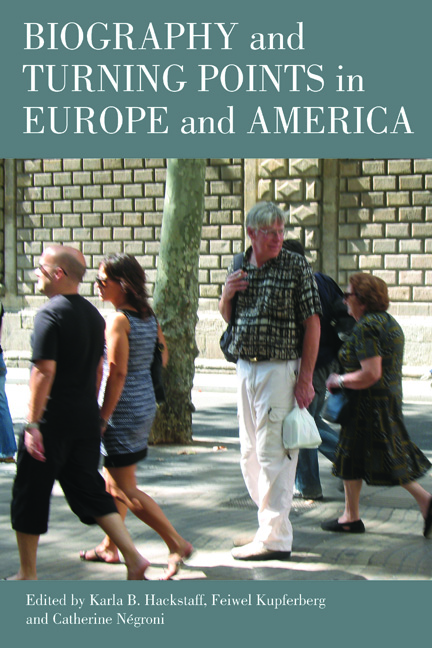Book contents
- Frontmatter
- Contents
- Notes on contributors
- Introduction: Advancing the dialogue on turning points
- one Unpacking biographical narratives: investigating stories of artistic careers in Northern Jutland, Denmark
- two Turning points in the life course: a narrative concept in professional bifurcations
- three Conjugal separation and immigration in the life course of immigrant single mothers in Québec
- four Migration biography and ethnic identity: on the discontinuity of biographical experience and how turning points affect the ethnicisation of biography
- five Biographical structuring through a critical life event: parental loss during childhood
- six Decisive turning points in life trajectories of violence among young men in the barrios of Caracas: the initiation and biographical reconversion to non-violent lifestyles
- seven The turning points of the single life course in Budapest, Hungary
- eight Complicating actions and complicated lives: raising questions about narrative theory through an exploration of lesbian lives
- nine Religious conversion as a biographical turn/ing: the case of Orthodox believers in contemporary Russia
- ten Conclusion: theorising turning points and decoding narratives
- Index
six - Decisive turning points in life trajectories of violence among young men in the barrios of Caracas: the initiation and biographical reconversion to non-violent lifestyles
Published online by Cambridge University Press: 01 September 2022
- Frontmatter
- Contents
- Notes on contributors
- Introduction: Advancing the dialogue on turning points
- one Unpacking biographical narratives: investigating stories of artistic careers in Northern Jutland, Denmark
- two Turning points in the life course: a narrative concept in professional bifurcations
- three Conjugal separation and immigration in the life course of immigrant single mothers in Québec
- four Migration biography and ethnic identity: on the discontinuity of biographical experience and how turning points affect the ethnicisation of biography
- five Biographical structuring through a critical life event: parental loss during childhood
- six Decisive turning points in life trajectories of violence among young men in the barrios of Caracas: the initiation and biographical reconversion to non-violent lifestyles
- seven The turning points of the single life course in Budapest, Hungary
- eight Complicating actions and complicated lives: raising questions about narrative theory through an exploration of lesbian lives
- nine Religious conversion as a biographical turn/ing: the case of Orthodox believers in contemporary Russia
- ten Conclusion: theorising turning points and decoding narratives
- Index
Summary
Introduction
This chapter discusses the usefulness of the concept of ‘turning points’in the effort to understand, first, the biographical narratives of young men who initiated and sustained a trajectory of violence, and second, the narratives of biographical reconversion related by young men who developed a trajectory of violence, and who managed to redefine and transform their lifestyles as well as their identities and life projects.
In the first part of this chapter I discuss, departing from the narratives of the youths I have interviewed, that the initiation in violent life trajectories can be described as a clamour for respect that emerged vis-à-vis repeatedly unbearable humiliations coming from armed gang members in their neighbourhood, where neither public security nor protection are guaranteed. These cumulative humiliations, and especially the finding of a firearm, are the fundamental processes to produce a decisive turning point in their trajectories that expresses itself in new definitions of the self, a substantial modification of the routines of daily life linked to the use of firearms, and new relationships with their neighbours and other youngsters from the neighbourhood, particularly comrades in their gang and other youth perceived as enemies. Referring to this transformation, the youths speak about the “entry into another world”, or describe it in terms of having a “healthy mind” to having a “sick mind”.
In the second part of this chapter, based on subsequent research developed in Caracas among another group of young adults, I focus on the biographical reconversion of the life trajectories of young men who previously led violent lives but who managed to forge new, non-violent lifestyles. Again, the concept of ‘turning point’ was a salient analytical tool in the interpretation of these life stories. I identify the decisive importance of a critical incident in the biographical reconversion of these young men that can be described as the awareness of the destruction of the self.
First, I present the context where these youths have grown and lived, briefly exposing how the methodological itinerary developed in the research on which this chapter is based.
The most obvious violence: the increase of violent deaths
The violence that concerns us, which begins to become evident starting from the 1990s in cities such as Cali, Medellín, Río de Janeiro and especially, Caracas, is surprising for many people because of its excess (Zaluar, 1997). It is a violence that is inserted in a network of relationships tinted by lack of restraint and privatisation of revenge.
- Type
- Chapter
- Information
- Biography and Turning Points in Europe and America , pp. 143 - 166Publisher: Bristol University PressPrint publication year: 2012



